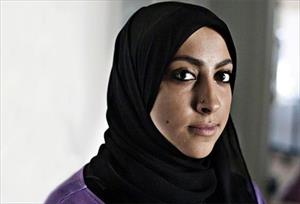(Ahlul Bayt News Agency) - "The thing about Bahrain is that nobody really knows what's going on there because there's not much media coverage but the protests never stopped," Maryam al-Khawaja said during a recent lecture at the American University of Beirut, CNN reported.
At just 26, the young Bahraini woman is already one of her country's most outspoken rights activists, and she's on a mission: to make sure "that people across the world, not just the Arab world, across the world, are hearing about what's going on the ground."
To carry out that mission, al-Khawaja -- who has dual Bahraini and Danish citizenship, and is the acting president of the Bahrain Center for Human Rights -- lives in exile and travels the world explaining how her people are oppressed.
"Every single day," al-Khawaja says, "between 15 to 25 different areas come out to protest in Bahrain. Every single day."
Those demonstrations began in February 2011, at the height of the Arab Spring. Bahraini citizens, spurred by successful uprisings in Tunisia and Egypt, demanded democratic reforms and other changes in the way the country was run.
But Bahrain's uprising failed to gain the traction of other regional revolutions after a crackdown by authorities in the tiny island state, backed by troops from nearby Saudi Arabia and the United Arab Emirates.
Demonstrators say authorities killed dozens of people and arrested, tortured and imprisoned hundreds of others. Opposition leaders have tried to keep the protest movement alive.
For al-Khawaja, the cause continues. She says her countrymen and women will not be silenced, despite the odds they face.
"When you're talking about human rights, it's black and white," she says. "There's no excuse for committing human rights violations. "
Al-Khawaja accuses Bahrain's government of committing violations on a daily basis, and says her organization exists in part to document those abuses.
Anti-government protesters have been holding peaceful demonstrations across Bahrain since mid-February 2011, calling for an end to the Al Khalifa dynasty.
Violence against the defenseless people escalated after a Saudi-led conglomerate of police, security and military forces from the Persian Gulf Cooperation Council (PGCC) member states - Saudi Arabia, Kuwait, the United Arab Emirates, Oman and Qatar - were dispatched to the tiny Persian Gulf kingdom on March 2011, to help Manama crack down on peaceful protestors.
So far, tens of protesters have been killed, hundreds have gone missing and thousands of others have been injured.
/149

